- Home
- James Axler
Dark Resurrection Page 13
Dark Resurrection Read online
Page 13
Ryan didn’t say anything. It seemed like a lot of effort for a childish joke. Mebbe it was a cultural thing. Mebbe Chucho really hated rats.
Once again other prisoners started calling to their hero from the darkness down the hallway.
Ryan couldn’t understand what they were saying and his double didn’t translate. Ignoring the unintelligible back and forth, he asked Chucho, “So, when is our execution going to happen?”
“Who knows? Things never happened on time here even before the Matachìn showed up. The red sash traitors are very disorganized. There is much to be done in preparation, and they are probably still busy drinking to get up their courage to watch us die. They have to set up security along the parade route.”
“What if they take us to the city in separate trucks?” Ryan said. “That will make escape much more difficult.”
“They won’t do that. Two trucks would be harder to protect. More work.”
Then Ryan caught the scrape of more bootsteps, again coming their way. “Are they coming back for the plates?” he asked Chucho.
“I don’t think so. Listen…”
Ryan heard a different kind of rhythmic chanting. This was joyless, monotonal grunting; it sounded like a funeral dirge. Then came the unmistakable metallic rattle of tambourines, the same musical instrument he’d seen in the hands of the priests.
“I think it’s time,” Chucho said. “They are coming for us. We have to pretend we’re drugged. Keep your head down and don’t make any fast movements. Keep to the shadows as much as you can. Do whatever they tell you, but do it slowly.”
With that, Ryan’s double picked up the remaining food and dumped most of it into the cell’s toilet, a rusting, galvanized bucket. He poured the wine into the bucket, too, then put the empty bowls and bottles back in plain sight.
Ryan stood gripping the cell’s bars, looking down the low-ceilinged hall. He could see the execution detail approaching. The priests were in the lead, all eight of them, swaying in unison as they chanted and shuffled along under the weak electric light. Some of them swung incense burners beside their ankles. Behind them was Fright Mask, and behind him was a contingent of red sash guards. They came to a halt outside the cell.
The governor-general of Veracruz stepped forward, stopping at the other side of the bars. Despite Chucho’s warning to stay back, Ryan stood his ground; he did half close his eye and pretended to be using the bars to hold himself upright.
As he had earlier in the day, Generalissimo al Modo wore the white uniform, the high pile of dreads in their golden cage. He was also carrying a gold-scabbarded, pearl-handled saber with pommel tassel. The corridor’s stark lighting made the deformations of his face seem all the more exaggerated, and horrifying. Ryan assumed the oral surgery had done something untoward to his salivary glands—Fright Mask was drooling between his golden fangs. Long strands of clear slime swayed off his chin.
Up close the general’s eyes radiated something that struck Ryan as very strange. He didn’t get the sense that there was a person trapped and peeking out from behind that hideously sculpted, permanent grin. It was like some other kind of creature was looking out at him. Something alien, perhaps not of this earth. Something that had traveled to places where human beings were never supposed to go. And done things there that human beings were never supposed to do.
At Fright Mask’s signal, the priests advanced. Keeping well back from the bars, the men in the pointed hats and bleeding veils began their ritual, which consisted of mumbling punctuated by the occasional shout, a shuffling line dance, and the fanning of incense into the doomed men’s cell.
To Ryan it smelled like burning hair.
He stepped back from the pall of noxious smoke, moving slowly as Chucho had suggested. He moved to the rear wall, beside his cell mate. In a whisper, out of the corner of his mouth, Ryan asked Chucho what was going on.
“They are preparing us for sacrifice to the Atapuls,” the look-alike hissed back. “This is the priests’ purifying ritual.”
“How about giving us a purifying bath?”
“It’s a spiritual cleansing,” Chucho said. “It doesn’t require soap and water. We don’t smell too bad compared to the Matachìn.”
“Yeah, they work hard at it.”
Amid the clouds of burning hair smoke, the spider priest, Itzamna, whipped out a clutch of pale tubular objects.
Ryan nudged Chucho.
“They’re bird quills,” his double informed him, “plucked from sea eagles’ wings.”
Ryan estimated they were ten inches long and a quarter inch in diameter.
Itzamna leaned down, stuck his head next to the nearest censer, sucked in a mouthful of hair smoke, then puckered up and blew it through one of the quills. The smoke didn’t just come out the far end; it also seeped out through a series of holes drilled along the top of its length.
Chucho continued the hushed explanation. “He’s blessing the pointed instruments they’re shortly going to push crosswise through our limp dicks. The holes they’ve drilled allow the blood to drip into the hollow tube and out the lower end.”
“Then what?” Ryan said, grimacing.
“They’ll smear the collected blood on parchment and burn it in a sacred pot for the Lords of Death. Since they are far away in Xibalba, they won’t be present in spirit or flesh at our executions, so the priests are sending them an offering—and an announcement of the proceedings—they can smell and taste.”
“A smoke signal.”
“That will reach all the way to the Underworld.”
When the priests finished, Fright Mask addressed the prisoners.
In hushed tones, Chucho translated. “It’s pre-execution boilerplate. He says he represents the civil authority of Veracruz. His power is granted directly from the god of gods, the Great One, himself, Atapul X, who has ordained a proper punishment for the numerous crimes of which we’ve been convicted. Atapul X who controls the great city-states. Who controls the navies. Who controls the seeds of plague. Who is responsible for all human suffering. Who takes that suffering as his due. Who considers human beings to be his personal playthings.”
Ryan noticed that during the delivery of the speech the governor-general’s drooling had taken on epic proportions. The threads of slobber trailed more than two feet from his chin, their globular ends swinging back and forth like pendulums. The glistening strands were absolutely mesmerizing. The more Fright Mask talked, the longer they grew.
Ryan caught himself wondering how long the damned things could get. Could they drip all the way to the floor without breaking?
The governor-general looked like a ravening beast. Had the Lords of Death made him so? Had he begged them to be horribly altered, or was it a requirement of the office he held? Or had his Masters done it on a whim? And how exactly had they managed to make the changes without killing him in the process? Some arcane, predark whitecoat sleight of hand no doubt. Ryan imagined more man-beasts just like him, sitting atop each of the thrones of the other subject city-states. Moving a jaw and face so distorted had to involve constant, perhaps excruciating discomfort. The upper and lower jaws couldn’t be closed because of the size and position of the artificial fangs.
Some price to pay for power.
Fright Mask directed a stream of vitriol at Ryan’s cell mate.
“He says I’ve been a thorn in the side of order and civilization for too long,” Chucho told him. “How the world is going to be a better place without me. Justice for all the red sashes and priests I’ve killed.”
From somewhere deep in the prison, the Chucho song started up again. Very faint at first, then louder and louder as other prisoners joined in.
Fright Mask recognized the words and melody, because he instantly stiffened. He turned and shouted something down the corridor.
Ryan guessed it was shut up or die.
Despite the threat, or because they understood the limits of their oppressors’ power under the circumstances, the prisoners kept singi
ng.
Some of the red sashes hurried off to try to enforce their commander’s order for silence. A futile gesture, as the singers in one corridor might stop while others elsewhere in the dungeon picked up the refrain.
Meanwhile, Fright Mask addressed more drooling diatribe at the central subject of the popular folk song. The remaining red sashes found gratifying whatever it was their leader said. They smiled and nodded. However, the tirade didn’t have any noticeable effect on Chucho.
Ryan was surprised at that. He half expected an angry outburst from his double. Scathing words in return. Dire threats of revenge. A lunge at the bars. Or some obscene ventriloquism. But Chucho held both his tongue and his temper. He winked at Ryan.
At Fright Mask’s command, a red sash pulled out a ring of keys and unlocked the cell door. This while five other traitors held Ryan and Chucho at blasterpoint. The noose-bearers stood at the ready as the door creaked back.
The governor-general howled at the prisoners, his copious spittle spraying across the bars.
“He wants us on our knees,” Chucho said.
“Sure, why not.”
Ryan and his look-alike dropped meekly to the stone floor.
The noose-bearers advanced into their cell with extreme caution. Holding the poles like lances out in front of them, they approached the chained and kneeling men.
As the nooses were extended above their heads, Fright Mask sputtered something else in their direction.
“What did he say?” Ryan asked Chucho.
“Time to start the dying.”
Chapter Fourteen
Harmonica Tom squeezed back through the slit in the power plant’s rusting hurricane fence, careful not to catch his bill cap, poncho or backpack on the ragged edges of the mesh. It was much easier slipping out than it had been slipping in, because over the course of half an hour he had considerably lightened his load. Behind him, in separate parcels scattered through the plant’s generator room, the tank farm and the step-up station he had left close to seventy pounds of prepped, primed and ready-to-rip plastic explosive. Only about twenty pounds of the stuff remained in the pack on his back.
As he’d anticipated, the job had been a cinch. Case in point: he’d actually run into a plant worker between the rows of ninety-thousand-gallon fuel tanks. The guy in the hardhat was walking one way as he was walking the other; this shortly after he’d mined the base of an oil reservoir with five pounds of C-4. He and the worker had passed each other with a nod and a wave. The worker hadn’t even looked back.
Spread out ahead of him, Tom could see the parade route leading from the illuminated fort to the glowing city. It was marked by pools of light thrown by the peninsula’s mercury vapor lamps. The vibrant radiance of Veracruz reflected off the solid, low overcast of the sky. The night was moonless and starless.
Made-to-order for what he had in mind.
Tom heard amplified music in the distance, coming from the direction of the main square. Along the waterfront, the city’s lighthouse was ablaze with red-colored spotlights. Because he’d done a quick recce before sunset, he knew it was going to be the venue for the executions. Grandstands had been set up in the middle of the road for high-ranking spectators. From what he’d gathered on the backstreets and in the alleys, the mood of the common people of Veracruz was nothing short of dread. Away from the scrutiny of red sashes and priests, their jubilation transformed into anger and sorrow. Expressing displeasure or alarm over the upcoming festivities was dangerous. While loitering on the street, Tom had overhead a mother warning her quartet of wide-eyed, knee-high children not to cry over the fact that their beloved Chucho was scheduled to die that night.
And when a red sash appeared around the corner and saw the tear-streaked little faces, he pushed past the other pedestrians, caught hold of the mother’s arm and twisted it behind her back. Then he threatened her with an immediate beating if she didn’t put an end to her children’s sobbing.
At that point Tom had reached under his poncho for the grips of his MP-5 SD-1. Before things got out of hand though, the woman squirmed from her tormentor’s grasp and hurried her children away.
The red sash had called something at her back. Something nasty, no doubt.
As soon as the bastard left, strutting off like a rooster, the people still standing around on the sidewalk spit on the pavement and cursed him. And then they muttered prayers for Chucho. Not Ryan, just Chucho. As Tom had guessed, they didn’t know the Deathlands warrior from shit.
Back on Tempest he had looked up the word gemelo in his predark Spanish textbook. Whatever the “twin” business was about, the folks of Veracruz weren’t buying it, at least not in private, when there were no red sashes or priests around.
The daylight recce gave Tom his first real understanding of the plight of these people and their relationship to the Matachìn. They were victims, as much as his fellow Deathlanders on Padre Island. They had been terrified into passivity. Even though they outnumbered the red sashes a thousand to one, they allowed themselves to be dominated and exploited by them. For reasons that were not obvious to Tom, they had convinced themselves that they couldn’t fight this enemy and win.
The damage he was about to do to the local infrastructure would cause them all to suffer—man, woman and child. There was no doubt about that. Mebbe it would give them a chance to break free? Sometimes good things came in ugly packages. But whether that was the ultimate outcome of the demolition job was not his particular concern. After all, they were foreigners, strangers to him. His countrymen and women were locked up in that stone shithole of a prison. His people were dead and left unburied on Padre Island, food for the flies, rats and gulls.
To pay back an unspeakable evil, a lesser evil had to be committed. Hey, shit happened, Tom told himself. And it almost always happened to the people who deserved it the least.
It took him fifteen minutes of fast walking to reach Tempest. Tom entered through the forward companionway and retrieved a loaded ballistic nylon duffel from the main cabin. Back on the foredeck, before he set the bag down inside the ship’s dinghy, he opened the zipper and took out a Petzl headlamp, which he slipped over the crown of his bill cap. He then swung out the dinghy on its davit, lowered it into the water and climbed in.
Sitting on the thwart seat with his back to the bow, Tom dipped his oars and began rowing slowly along the shore, past the ruined piers, toward the ancient fortress. The rafted-up rows of small commercial vessels were deserted. The only people he saw on the streets beyond were hurrying away for the parade or the big show in the city.
When he glanced over his shoulder to check his progress, he could see the fort was lit up. The towering battlements looked as white as bone in the hard glare of the spotlights. He rowed close to the stone quay east and opposite the main complex. Other boats were moored there, tied up to the end of the surviving pier and to each other. They, too, were deserted. As he eased around the last of the boats, into the protected water in the lee of the fort, there were no challenges from the ramparts even though he was in plain view and he could see the heads and shoulders of men moving around up there. He figured the fort’s sentries were too occupied with other duties—or too drunk in celebration—to notice or care about one guy in a dinky little rowboat.
Tom knew that most of the red sashes were three miles away in the city, manning the security detail for the executions. Plenty far enough away so they couldn’t interfere with his plans. That’s where most of the civilians were, too, where in a few minutes it would be pitch-black.
What would happen there in the dark, when the red sashes were surrounded by the people they had been abusing? he asked himself. When there was no one taking down names? The possibilities made him crack a smile.
Come daybreak it wouldn’t just be paper heads on poles lining the streets.
And the new heads would be wearing straw hats.
Looking over his shoulder, Tom steered the dinghy deeper into the little embayment, toward the edge of the chan
nels that formed saltwater moats around the three-story main fort and the story-smaller prison block. Down the narrow, central canal, which was bracketed on either side by stone battlements, he could see the footbridge that led to the dungeon. It was two hundred feet away.
Close enough.
Tom stopped rowing, shipped his oars, unzipped the duffel and took out the remote detonator. While the dinghy drifted, he carefully stood and pointed the device in the direction of the power plant. He could see its lights on the horizon, above and between the roofs of the peninsula’s warehouses.
At that moment someone yelled down at him from the top of the fort’s eastern tower. A challenge? A warning?
Either way, it was a little late.
He flipped off the safety and hit the red “fire” button.
There was a half-second delay. The radio signal had to cross the intervening ground before it triggered the blasting caps. When the explosions came, they were virtually simultaneous.
A very, very big bang.
The blinding flash underlit the belly of the cloud cover, sandwiched between earth and sky, spreading faster than an eyeblink in a wider and wider circle, its brilliance overwhelming and obliterating the glow of Veracruz.
For an instant it was almost as bright as day.
In that instant a series of images burned into Tom’s retinas.
The exploding main transformer sent a barrage of phosphorus-white comets the size of wag wheels hurtling skyward.
The power plant’s walls blew out sideways and the entire complex collapsed in on itself, vanishing in a ball of flame. Even wider fireballs erupted within and engulfed the tank farm.
A half second later the sound wave struck. As it boomed over Tom, and then out over the bay, he could feel the rumble shaking his bowels. With his upright body acting as a sail, the concussion gust actually pushed the dinghy backward.

 End Program
End Program Nemesis
Nemesis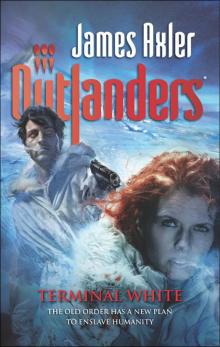 Terminal White
Terminal White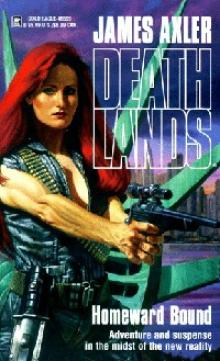 Homeward Bound d-5
Homeward Bound d-5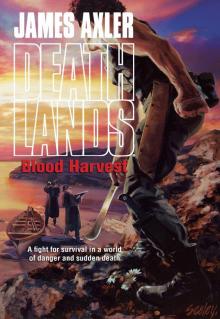 Blood Harvest (v5)
Blood Harvest (v5)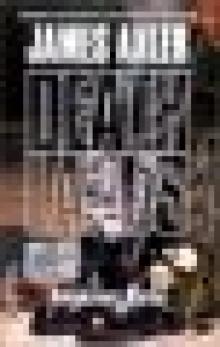 Amazon Gate
Amazon Gate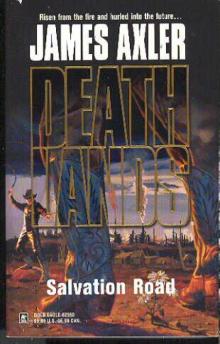 Salvation Road
Salvation Road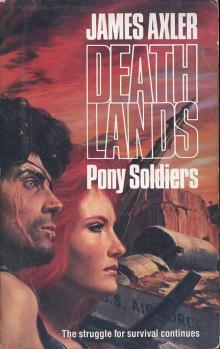 Pony Soldiers
Pony Soldiers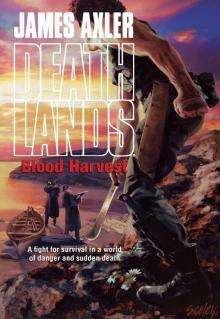 Blood Harvest
Blood Harvest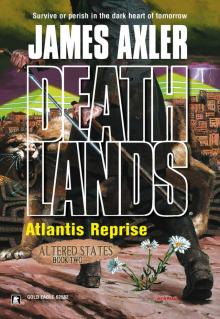 Atlantis Reprise
Atlantis Reprise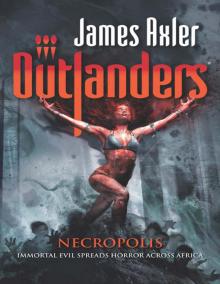 Necropolis
Necropolis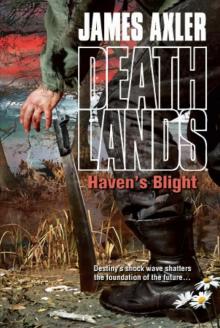 Haven's Blight
Haven's Blight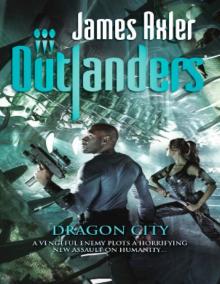 Dragon City
Dragon City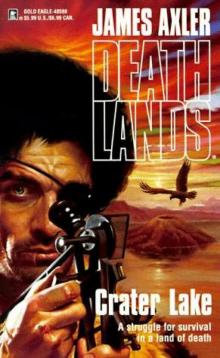 Crater Lake
Crater Lake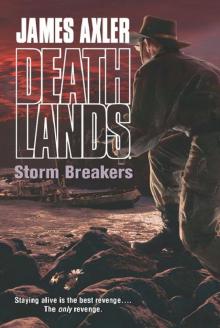 Storm Breakers
Storm Breakers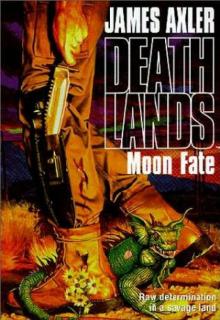 Moon Fate
Moon Fate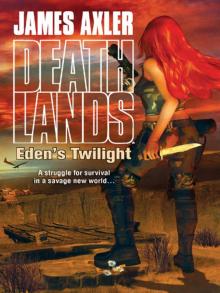 Eden’s Twilight
Eden’s Twilight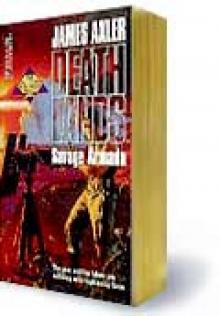 Savage Armada
Savage Armada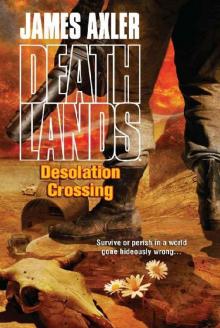 Desolation Crossing
Desolation Crossing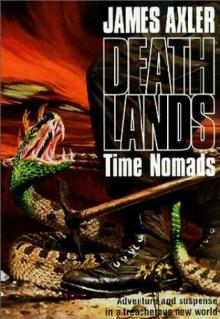 Time Nomads
Time Nomads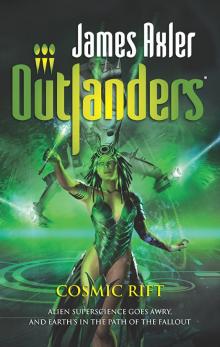 Cosmic Rift
Cosmic Rift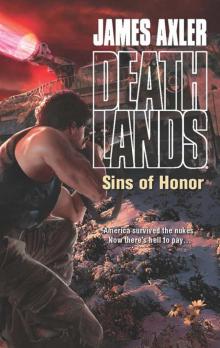 Sins of Honor
Sins of Honor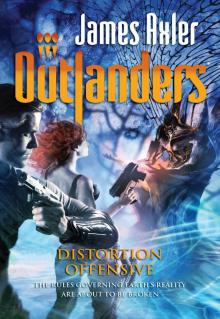 Distortion Offensive
Distortion Offensive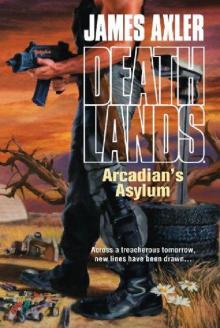 Arcadian's Asylum
Arcadian's Asylum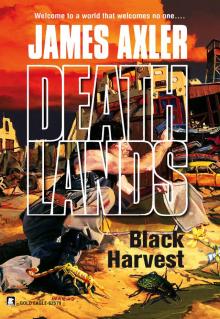 Black Harvest
Black Harvest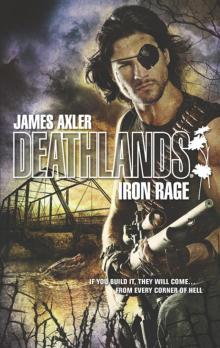 Iron Rage
Iron Rage Nightmare Passage
Nightmare Passage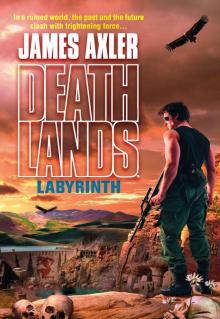 Labyrinth
Labyrinth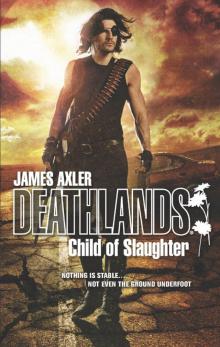 Child of Slaughter
Child of Slaughter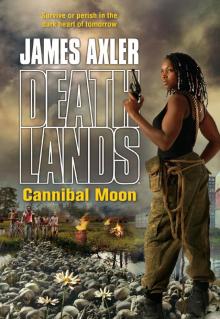 Cannibal Moon
Cannibal Moon Tainted Cascade
Tainted Cascade Ritual Chill
Ritual Chill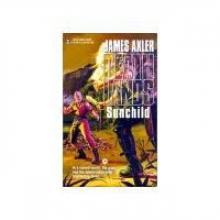 Sunchild
Sunchild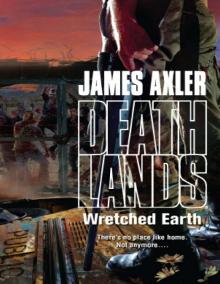 Wretched Earth
Wretched Earth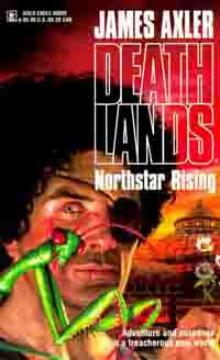 Northstar Rising d-10
Northstar Rising d-10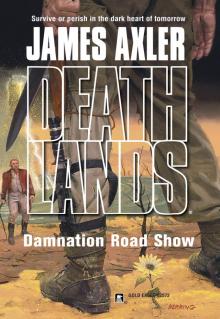 Damnation Road Show
Damnation Road Show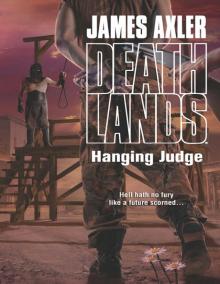 Hanging Judge
Hanging Judge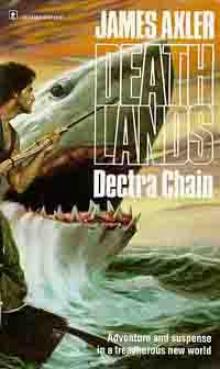 Dectra Chain d-7
Dectra Chain d-7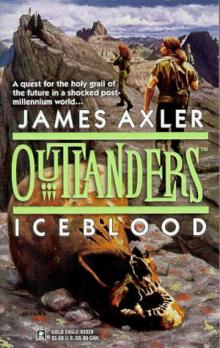 Iceblood
Iceblood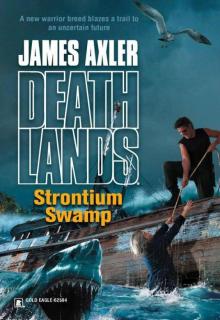 Deathlands 074: Strontium Swamp
Deathlands 074: Strontium Swamp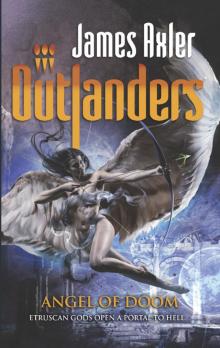 Angel of Doom
Angel of Doom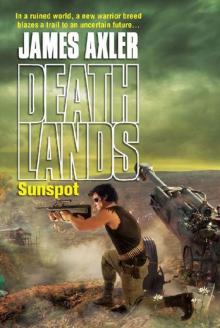 Sunspot
Sunspot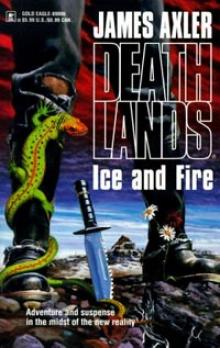 Ice and Fire d-8
Ice and Fire d-8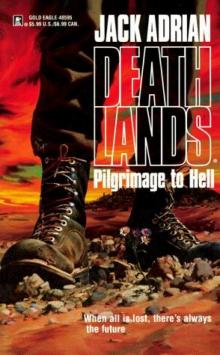 Pilgrimage to Hell d-1
Pilgrimage to Hell d-1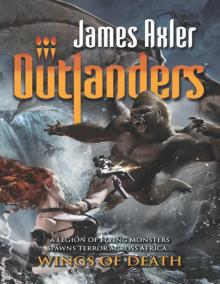 Wings of Death
Wings of Death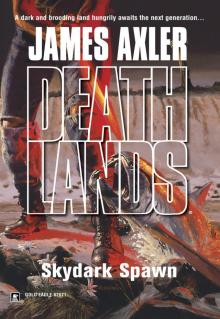 Skydark Spawn
Skydark Spawn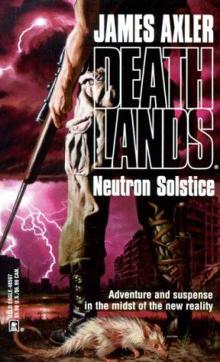 Neutron Solstice d-3
Neutron Solstice d-3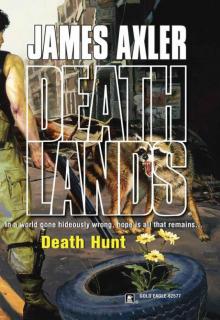 Deathlands 067: Death Hunt
Deathlands 067: Death Hunt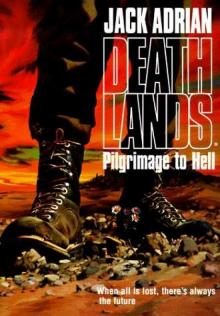 Pilgrimage to Hell
Pilgrimage to Hell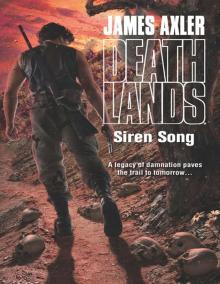 Siren Song
Siren Song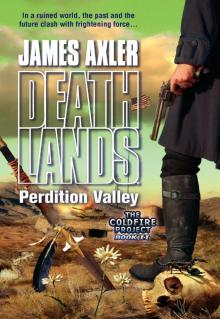 Perdition Valley
Perdition Valley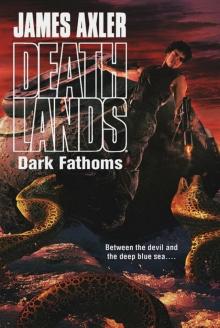 Dark Fathoms
Dark Fathoms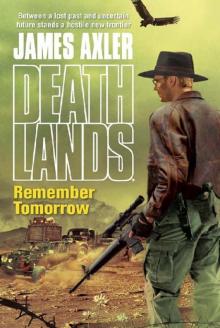 Remember Tomorrow
Remember Tomorrow Crucible of Time
Crucible of Time Savage Armada - Deathlands 53
Savage Armada - Deathlands 53 Judas Strike - Deathlands 54
Judas Strike - Deathlands 54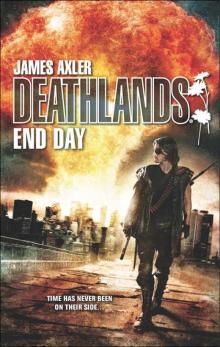 End Day
End Day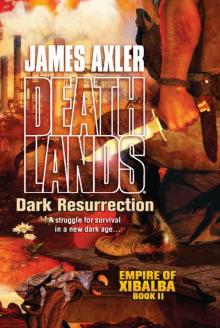 Dark Resurrection
Dark Resurrection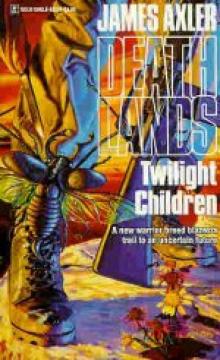 Deathlands - The Twilight Children
Deathlands - The Twilight Children Deathlands 068: Shaking Earth
Deathlands 068: Shaking Earth Breakthrough
Breakthrough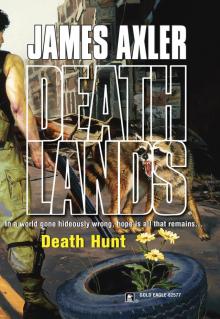 Death Hunt
Death Hunt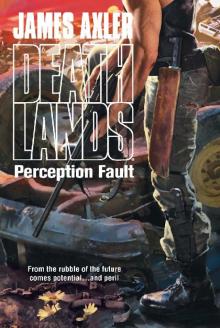 Perception Fault
Perception Fault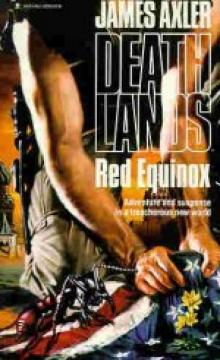 Red Equinox
Red Equinox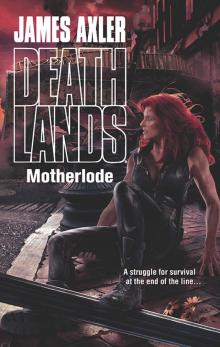 Motherlode
Motherlode Deathlands 071: Ritual Chill
Deathlands 071: Ritual Chill Hell Road Warriors
Hell Road Warriors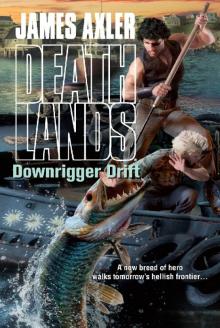 Downrigger Drift
Downrigger Drift Gaia's Demise
Gaia's Demise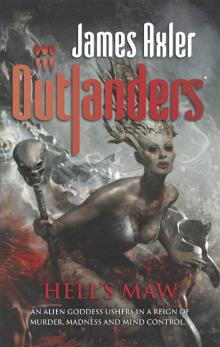 Hell's Maw
Hell's Maw Devil's Vortex
Devil's Vortex Prodigal's Return
Prodigal's Return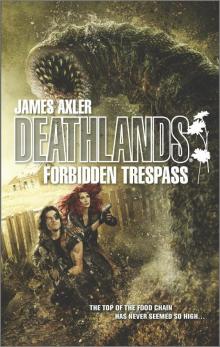 Deathlands 122: Forbidden Trespass
Deathlands 122: Forbidden Trespass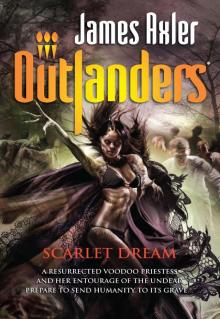 Scarlet Dream
Scarlet Dream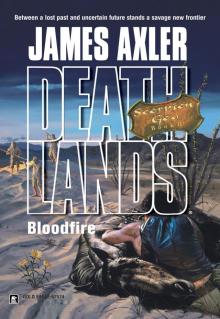 Bloodfire
Bloodfire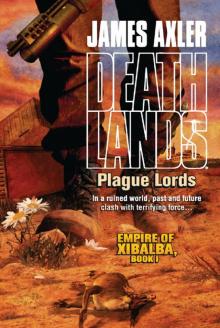 Plague Lords (Empire of Xibalba, #1)
Plague Lords (Empire of Xibalba, #1)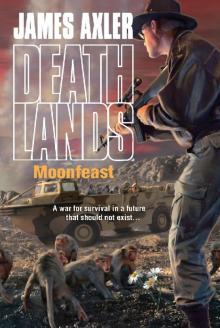 Moonfeast
Moonfeast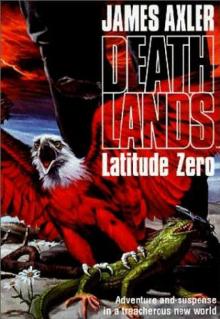 Latitude Zero
Latitude Zero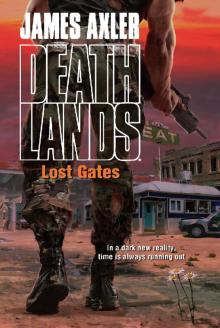 Lost Gates
Lost Gates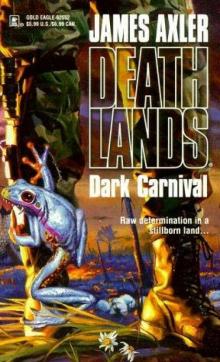 Dark Carnival
Dark Carnival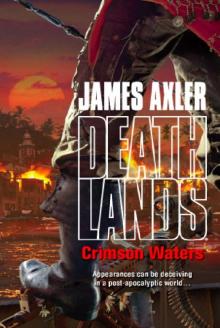 Crimson Waters
Crimson Waters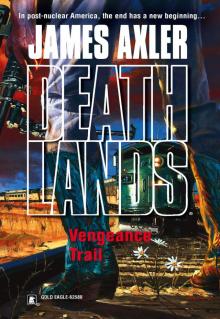 Vengeance Trail
Vengeance Trail Apocalypse Unborn
Apocalypse Unborn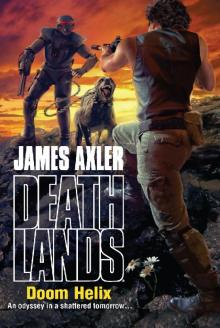 Doom Helix
Doom Helix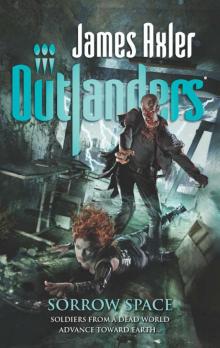 Sorrow Space
Sorrow Space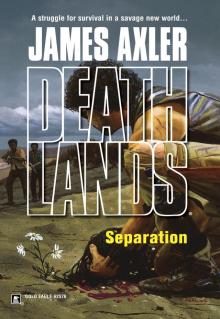 Separation
Separation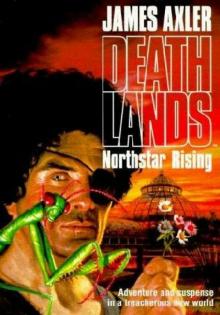 Northstar Rising
Northstar Rising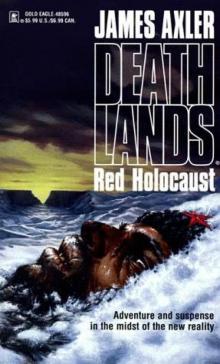 Red Holocaust
Red Holocaust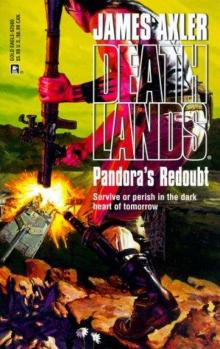 Pandora's Redoubt
Pandora's Redoubt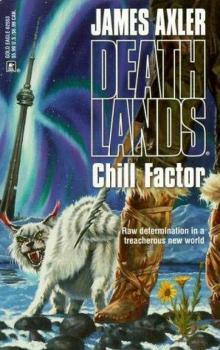 Chill Factor
Chill Factor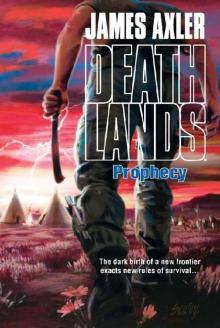 Prophecy
Prophecy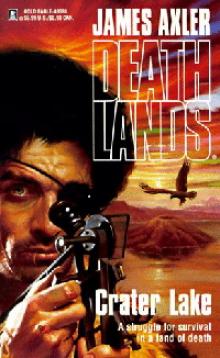 Crater Lake d-4
Crater Lake d-4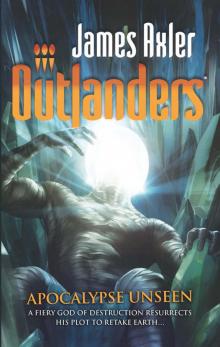 Apocalypse Unseen
Apocalypse Unseen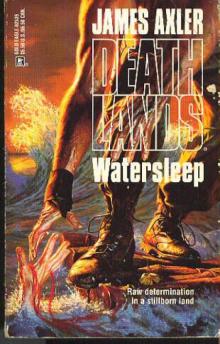 Watersleep
Watersleep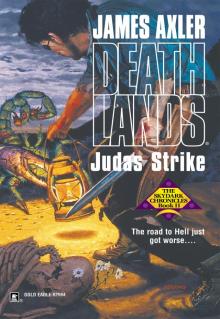 Judas Strike
Judas Strike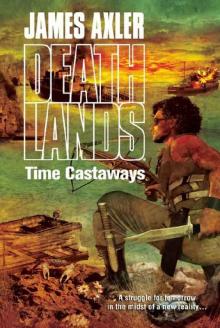 Time Castaways
Time Castaways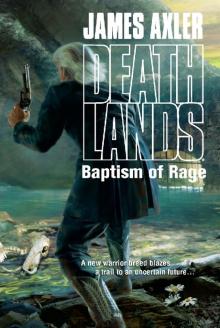 Baptism of Rage
Baptism of Rage Polestar Omega
Polestar Omega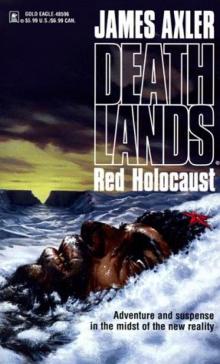 Red Holocaust d-2
Red Holocaust d-2 Outlanders 15 - Doom Dynasty
Outlanders 15 - Doom Dynasty Way of the Wolf
Way of the Wolf Deathlands 075: Shatter Zone
Deathlands 075: Shatter Zone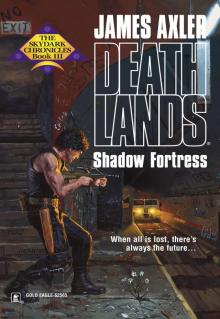 Shadow Fortress
Shadow Fortress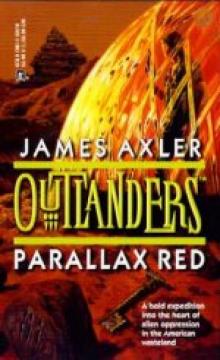 Outlander 05 - Parallax Red
Outlander 05 - Parallax Red Shaking Earth
Shaking Earth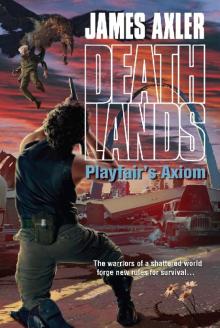 Playfair's Axiom
Playfair's Axiom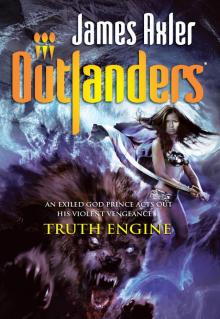 Truth Engine
Truth Engine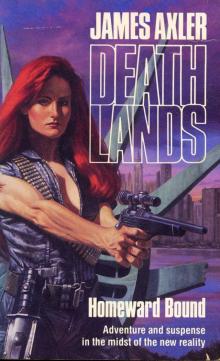 Homeward Bound
Homeward Bound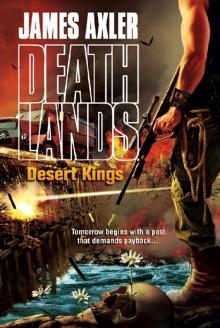 Desert Kings
Desert Kings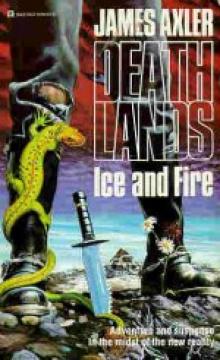 Ice and Fire
Ice and Fire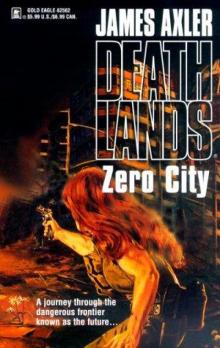 Zero City
Zero City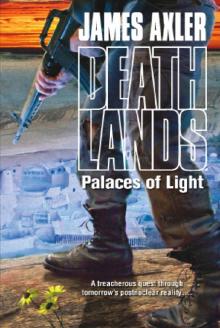 Palaces of Light
Palaces of Light No Man's Land
No Man's Land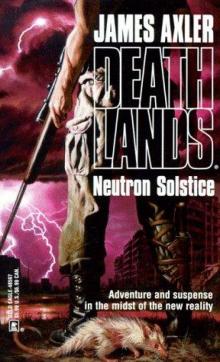 Neutron Solstice
Neutron Solstice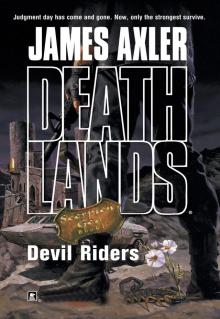 Devil Riders
Devil Riders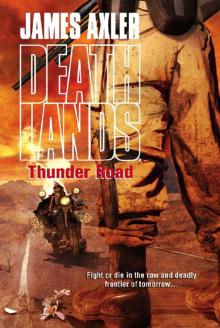 Thunder Road
Thunder Road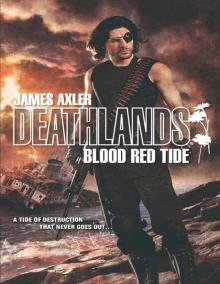 Deathlands 118: Blood Red Tide
Deathlands 118: Blood Red Tide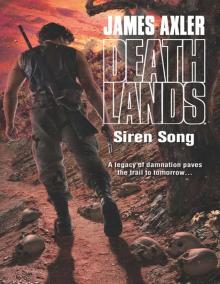 Deathlands 114: Siren Song
Deathlands 114: Siren Song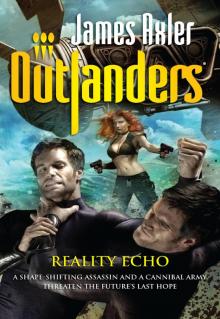 Reality Echo
Reality Echo Hive Invasion
Hive Invasion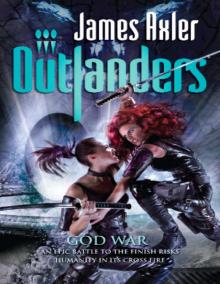 God War
God War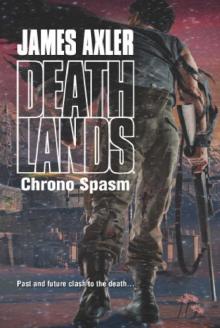 Chrono Spasm
Chrono Spasm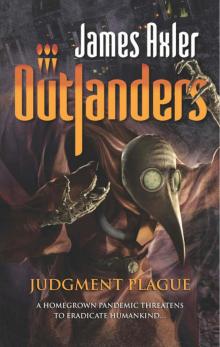 Judgment Plague
Judgment Plague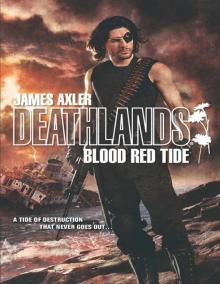 Blood Red Tide
Blood Red Tide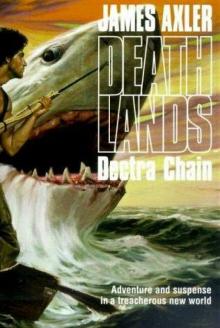 Dectra Chain
Dectra Chain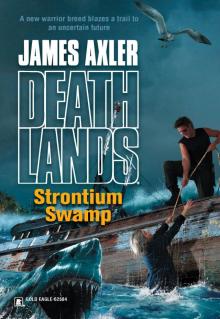 Strontium Swamp
Strontium Swamp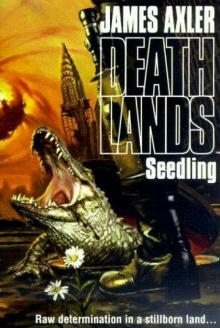 Seedling
Seedling Shatter Zone
Shatter Zone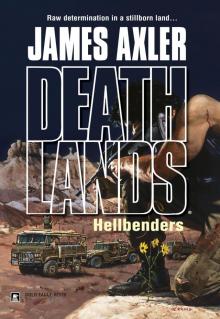 Hellbenders
Hellbenders